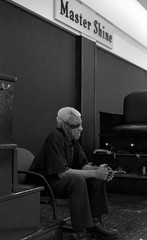We were at a party last night and Adrian says "Look what I got:
The Mind of the South," and say "Cool. Uh, what's that?" So he hands me the book and I flip immediately to page 53:
Such is the primary picture. But I must not leave the theme without calling your attention specifically to the stimulation of the tendency to violence... Nor must I leave it without pointing to two significant patterns which grew up in the closest association with this romanticism and hedonism and served it as channels of discharge.
The first of these is the Southern fondness for rhetoric. A gorgeous primitive art addressed to the autonomic system and not to the enchephalon, rhetoric is of course dear to the simple man everywhere...
Well, I read that and laughed and thought "What the hell is this?" and we all got a chuckle out of its ornate prose and "fondness for rhetoric."
I am no longer making fun of the book, though. I've been flipping through it and, while it is "primitive" in its approach to social sciences and says sweeping, generalizing things like "The Yankee" and "The Southerner" and "The Negro" all the time, W.J. Cash's book is truly interesting. Right now I'm reading p. 331 where he is listing a whole slew of incidents in which professors at various universities have been fired for saying things like "The North was generally in the right" or Booker T. Washington was a great man. Earlier, Cash goes into the whole idea of victimization in "The Southerner." I can only say that this foreshadows the current nativist trends in the Republican party, the militia movement and various right winger purveyors of hate. His writing is thus an ancestor to books I love like
What's the Matter with Kansas?,
Nixonland, and, obviously with Wendell Berry's stuff.
Cash's condemnation and deconstruction of lynching as a practice are great too. At one point he draws the obvious parallel that the KKK and the Nazi's are of a cloth: "In its essence the thing was an authentic folk movement--at least as fully such as the Nazi movement in Germany, to which it was not without kinship" (344). (Remember, this book appeared in 1941, so he doesn't need film reels of concentration camps to figure things out.) He goes on to relate the growth of the Klan in class terms: "Its body was made up of common whites, industrial and rural. But its blood, if I may continue the figure, came from the upper orders" (344). His point was, of course, that he saw through the upper class' self-interest. The KKK was being used in part to keep workers divided along racial lines.
Ok, I'm going to read now.
Thanks, Adrian. Much, much more interesting than I had thought.










